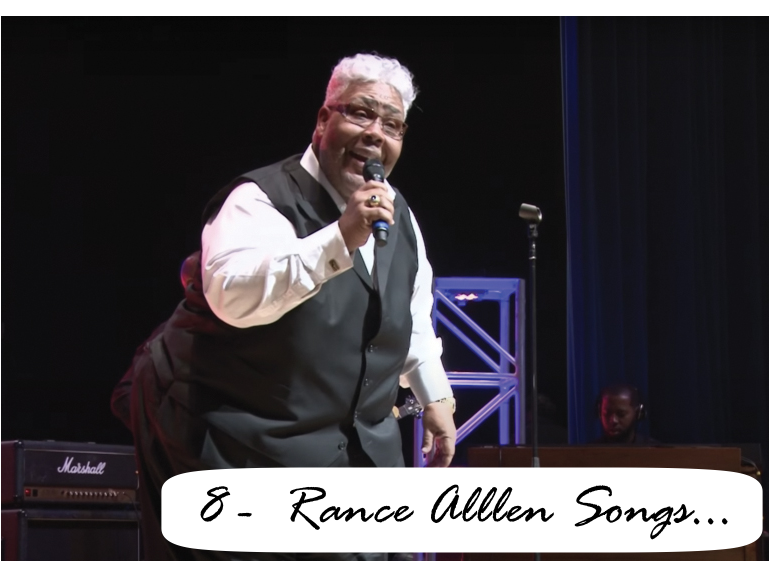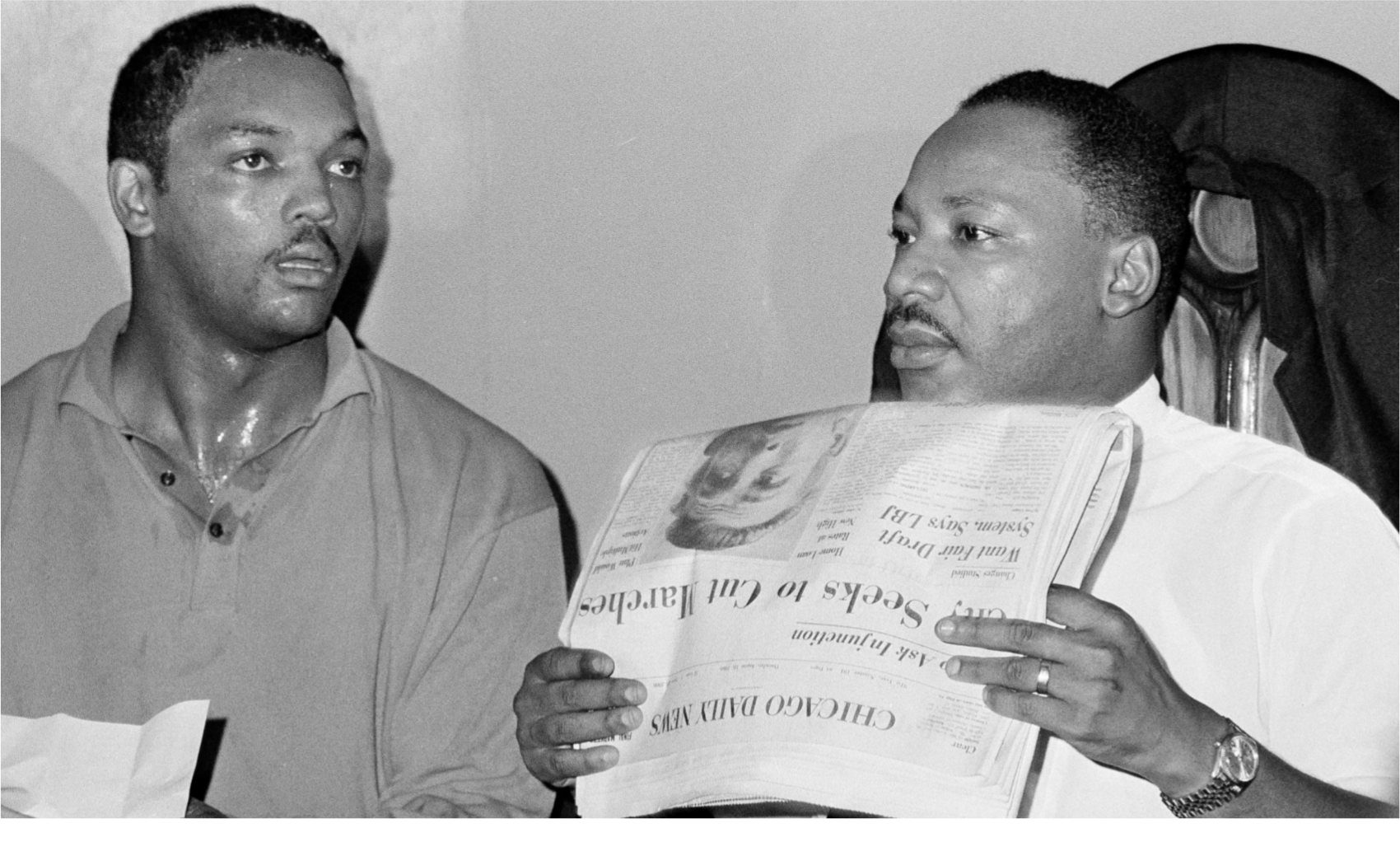(ThyBlackMan.com) Few voices in gospel music have ever soared quite like Rance Allen’s. Known as the lead singer of the groundbreaking Rance Allen Group, he fused traditional gospel with soul, funk, and R&B long before it was fashionable, helping shape contemporary gospel music as we know it today. His powerhouse vocals, charismatic stage presence, and fearless genre-crossing made him a once-in-a-generation talent. Whether you’re deeply rooted in gospel or just discovering its soulful side, these eight songs show why Rance Allen remains an essential listen in 2025 and beyond.

1. “Something About the Name Jesus” (Kirk Franklin feat. Rance Allen)
If you need proof that gospel can bridge generations, look no further than “Something About the Name Jesus.” Released in 1999 on Kirk Franklin’s The Nu Nation Project, this song remains one of the most beloved modern gospel tracks, largely because of Rance Allen’s unforgettable contribution. His rich, gritty yet velvet-smooth voice brings an old-school soul to Kirk Franklin’s contemporary production, proving that tradition and innovation can worship side by side.
What’s striking is how Rance’s delivery transforms the song. While the lyrics are simple — exalting the power in Jesus’ name — the passion in his voice elevates them to something deeper, something visceral. His ad-libs and vocal runs feel like a conversation with the divine, pulling you into a personal moment of praise even if you’re hearing it for the first time. His improvisations are never showy for the sake of showing off; instead, they’re an extension of his testimony — raw, unrehearsed, and real.
Part of what makes this track special is the intergenerational exchange happening within it. Kirk Franklin’s youthful energy and modern production pair perfectly with Rance’s old-school gospel grit. You hear decades of gospel history colliding in real time. Younger singers on the track harmonize behind Rance, but he’s the anchor — a living reminder of the gospel legends who laid the groundwork for contemporary praise.
Listening today, “Something About the Name Jesus” holds up as both a classic worship anthem and a masterclass in gospel performance. It still feels as fresh and relevant in Sunday services as it does blasting through headphones on a weekday commute. Younger listeners, too, continue to discover this song through TikToks and viral covers — a testament to its timeless impact. Churches still bring this one out for special altar calls or late-night revivals, and Rance’s voice lives on in every cover version.
If you want to understand why Rance Allen is revered by gospel giants and R&B artists alike, start here. It’s the perfect example of how his voice could take a simple refrain and make it feel like a personal testimony wrapped in four minutes of soul. Decades from now, this recording will still remind us that gospel’s power isn’t just in the words — it’s in the spirit of the voices that deliver them.
2. “Miracle Worker”
“Miracle Worker” showcases the Rance Allen Group at the height of their crossover powers. From its first funky bass line to the swirling organ and tight harmonies, the song proves that gospel doesn’t have to be confined to the pulpit — it can groove just as hard as any soul track. And over it all, there’s Rance’s unmistakable tenor, climbing effortlessly from hushed confession to full-throated praise.
What’s beautiful about “Miracle Worker” is how it straddles sacred and secular sensibilities. The lyrics remind listeners that miracles aren’t ancient fairy tales but living truths. Rance’s vocal delivery is filled with wonder — you can hear the awe and gratitude in every note. It feels intimate, like you’re witnessing someone testify about a blessing you can almost touch. The song’s arrangement only amplifies this effect — the syncopated drums, the bright horns, and that rolling bass line all create an atmosphere that’s equal parts sanctuary and Saturday night jam session.
Another layer that makes this song resonate is its universal message. Even listeners who aren’t steeped in church culture can connect with the idea that something bigger is at work. “Miracle Worker” feels like an invitation to believe again — not just in the divine but in possibilities, in second chances, in unseen blessings. Rance’s voice, soaring over the tight band, makes you feel like those miracles are unfolding right there with you.
Decades later, “Miracle Worker” is still fresh. In an era where gospel artists often chase mainstream appeal, this track reminds us that Rance Allen never had to force it — his sound naturally crossed barriers because it was rooted in authenticity. DJs and crate diggers still sample the track, appreciating its timeless blend of funk and faith. There’s a reason why gospel fans and vintage soul collectors alike keep this record spinning.
Listening to “Miracle Worker” now is like stepping into a vintage revival tent with a funk band as your choir. It’s a reminder that spiritual uplift can come with a deep, head-bobbing groove. For newcomers, it’s the perfect introduction to Rance Allen’s genius for making gospel joyful, relatable, and undeniably cool. Play it loud, and watch the walls between church and club disappear — exactly how Rance intended.
3. “I Belong to You”
In “I Belong to You,” the Rance Allen Group delivered one of their most tender and romantic gospel tracks — a love song to God that feels both personal and universal. The song is a standout from their Say My Friend album, which found the group experimenting even more boldly with lush, R&B-style production. The strings swell gently, the guitar licks shimmer with a warmth reminiscent of 70s soul, and the background vocals wrap around Rance’s lead like a choir of angels.
Rance’s voice on this song is pure velvet. He leans into his softer side, letting the lyrics breathe as he sings about devotion and surrender. The harmonies wrap around you like a warm blanket, and the understated arrangement allows his voice to shine front and center. You can hear the sincerity in every line. There’s a sweet vulnerability in his tone — a quiet declaration that even in a world of distractions and temptations, his heart remains anchored in faith.
What makes “I Belong to You” so enduring is its emotional honesty. In a world where faith can sometimes feel performative, Rance’s delivery feels private, like an overheard prayer. It’s a reminder that gospel is just as much about the quiet moments of connection as it is about high-energy praise breaks. You can almost picture Rance in the studio, eyes closed, pouring his heart into every word. It’s music that meets you in your most honest moments — your doubts, your gratitude, your quiet confessions.
Spinning this song today feels surprisingly modern. It’s the type of gospel ballad that fits on a playlist alongside soul legends like Al Green or Marvin Gaye. Younger listeners who stumble on this track are often surprised by how seamlessly it fits into their Sunday morning or late-night wind-down playlists. Rance’s timeless approach to melody and emotion ensures it never sounds dated.
If you’re looking for a song that will soothe your soul and remind you of the gentle side of worship, “I Belong to You” should be at the top of your list. It’s proof that sometimes the most powerful praise doesn’t shout — it whispers truths that live in your spirit long after the music fades.
4. “Ain’t No Need of Crying”
“Ain’t No Need of Crying” is gospel at its most comforting — a simple message wrapped in a melody that lingers long after the last note. Released in the mid-70s, this song reflects the Rance Allen Group’s uncanny ability to craft songs that feel like spiritual medicine for tough times. From the opening guitar chords and gentle keys, you know you’re in for a song that wants to soothe more than stir.
Rance’s voice here is full of warmth and assurance. He doesn’t shout or belt for effect; instead, he invites you in with gentle power. The lyrics — “Ain’t no need a worrying about your problem / ‘Cause worrying only adds to the pain / If when you feel like you’ve been caught in a hurricane / (caught in a hurricane) / You just wait on the sunshine after the rain” — speak directly to the listener’s weariness, offering hope without judgment. It’s like he’s sitting across from you in your living room, reminding you that this storm too shall pass.
What’s remarkable is how the song balances melancholy and uplift. The slow, bluesy arrangement lets the emotion breathe, while the backing harmonies echo the promise like a supportive choir of friends. There’s an intimacy in the recording that makes you feel held — like the band isn’t just performing but ministering directly to your spirit. It’s a hug in musical form, a reminder that gospel’s strength lies not just in its declarations of victory but in its willingness to sit with us in our struggle.
In 2025, “Ain’t No Need of Crying” still resonates deeply, especially in a world that can feel relentlessly heavy. It’s the kind of song that belongs on a late-night playlist for when you’re wrestling with doubt. It’s also the kind of track that generations pass down, from parents to children, as a balm for those nights when the tears feel unstoppable. And every time Rance’s voice assures you, you believe it a little more.
Rance Allen’s legacy is full of powerhouse moments, but this song proves he knew the power of quiet reassurance just as well. “Ain’t No Need of Crying” is timeless because it acknowledges our pain but insists on hope. It’s the gospel message distilled to its purest form: you are never alone, and the tears will not have the final say.
5. “Hot Line to Jesus”
Before cell phones and FaceTime, Rance Allen was already telling us about his direct connection to the divine. “Hot Line to Jesus” is one of his funkiest, most playful tracks — a joyous declaration that we have a direct line of communication to our Creator, anytime and anywhere. The song feels like a celebration of that instant access, delivered with the kind of grin that made Rance a gospel pioneer.
The song’s groove is unmistakable: a bouncy bass line, tight drums, and soulful keys make it impossible to sit still. You can hear the Stax and Motown influence in every riff and chord. Rance’s vocals slide effortlessly between spirited shouts and smooth croons, showing off his dynamic range. He teases the melody like a master showman, building anticipation before delivering those sky-high gospel runs that made him legendary. It’s church, but it’s also a dance floor.
What’s so refreshing about “Hot Line to Jesus” is its sense of fun. Gospel music often deals with heavy topics — pain, struggle, salvation — but Rance Allen reminds us that faith can be lighthearted too. He treats the idea of prayer not as a solemn ritual but as an everyday lifeline. His voice beams with confidence and warmth, encouraging us to pick up that spiritual “phone” and dial in for some divine guidance. He even tosses in playful spoken asides, a preacher’s banter that makes you feel like you’re in on a joke that only the faithful truly understand.
Even today, this song is a reminder that gospel doesn’t have to be confined to church walls — it can be a jam in your car or your kitchen. “Hot Line to Jesus” still sounds like it could drop on a modern neo-soul or gospel-funk playlist. Artists today borrow this blend of funk and faith, but few pull it off with Rance’s charm. It’s a feel-good track that perfectly captures his gift for making spirituality sound like a party.
Put this one on when you need to lighten your load, when you’re stuck in traffic, or when you just want to remember that a direct line to hope is always open. Rance Allen made faith feel immediate, accessible, and fun — and this track is one of the best examples of his spiritual swagger.
6. “Joy in My Soul”
By the 80s, the Rance Allen Group was fully embracing the crossover sound, and “Joy in My Soul” is a testament to their staying power. This track is an explosion of happiness, with Rance’s voice soaring above a driving rhythm section and tight gospel harmonies. It’s impossible to listen to this song and not feel your spirit lift. If “Hot Line to Jesus” is about getting the connection, “Joy in My Soul” is what happens when the line rings through.
From the opening bars, “Joy in My Soul” announces itself with a burst of energy. The horns blaze, the bass locks you in, and Rance’s unmistakable tenor dances over the beat. The instrumentation is classic Rance Allen — equal parts gospel choir and Motown band. It feels as if Aretha Franklin’s backing band wandered into a revival tent and found themselves praising right alongside the congregation. Rance’s delivery is pure exuberance; his runs and improvisations feel spontaneous yet perfectly controlled.
The lyrics speak to a joy that defies circumstances — the kind of inner peace that comes from faith, not fleeting happiness. It’s joy as a choice, joy as a declaration, joy as defiance. In a world obsessed with quick fixes and surface-level satisfaction, this song reminds us that real joy runs deeper. You can almost see Rance on stage, sweat on his brow, eyes lifted heavenward, as he belts out the words like an anthem.
More than four decades later, “Joy in My Soul” still sounds fresh. It’s a go-to for anyone needing an instant mood boost. Whether you’re playing it in your car, blasting it at a cookout, or slipping it onto a Sunday morning playlist, it reminds you that gospel can be just as much about dancing in celebration as it is about kneeling in prayer. And that’s the secret of Rance Allen: he could take you to church without ever leaving the groove behind.
Next time life tries to weigh you down, hit play on this song and let it remind you what it means to rejoice in spite of it all. “Joy in My Soul” is pure spiritual rocket fuel.
7. “If I Could Make the World Better”
“If I Could Make the World Better” is a hidden gem in Rance Allen’s catalog — a socially conscious gospel song that feels heartbreakingly relevant today. While many know him for his energetic praise jams, here he steps into the role of prophet and peacemaker. It’s a powerful statement about love, hope, and our collective responsibility to each other that still cuts straight to the heart.
Rance’s vocal is raw and pleading. You can hear the weight of the world in his tone, but also his unshakable faith that change is possible. There’s a sense of yearning in the way he phrases each line — a subtle rasp that cracks just slightly as he dreams out loud of a world without hate and division. The arrangement is stripped back compared to some of the group’s funkier tracks, allowing the message to take center stage. The gentle guitar and steady drumbeat feel like a heartbeat, steady and determined.
What makes this song special is its honesty. It doesn’t pretend that the world’s problems are easy to fix, but it holds out hope that love can be the foundation for something better. Rance’s delivery feels less like a performance and more like a heartfelt prayer for humanity. It’s not just “church music”; it’s a plea that reaches beyond the sanctuary walls into the streets where people hurt the most.
In 2025, “If I Could Make the World Better” could easily be sampled by modern artists looking for authentic gospel soul. Its message resonates across generations — a reminder that music can heal, challenge, and inspire all at once. It feels like the kind of song that should play under the credits of a documentary about community, or echo through the speakers at a peaceful rally for justice. It’s a testament to the timeless power of a voice that refuses to give up on people.
It’s a must-listen for anyone who wants to hear Rance Allen’s prophetic side. Play this track when you’re feeling overwhelmed by the state of the world. Let it remind you that sometimes the most radical thing you can do is believe we can be better — and then start loving like you mean it.
8. “That Will Be Good Enough for Me”
Closing this list is “That Will Be Good Enough for Me,” a song that perfectly encapsulates Rance Allen’s spiritual confidence and emotional vulnerability. It’s a slow-burning ballad about the promise of heaven and the peace that comes with unwavering faith. For all his electrifying performances, Rance was equally moving when he slowed things down and let the depth of his faith shine through.
Rance’s vocal performance here is nothing short of stunning. He takes his time, letting each note linger, each word sink in. There’s a sweetness in his tone, balanced by an undercurrent of longing — a desire for a better place beyond the struggles of this world. His high notes are ethereal, his low notes warm and reassuring, weaving a narrative that speaks to everyone who’s ever wondered what comes next.
The arrangement is lush but never overpowering. Gentle guitar strums, subtle keys, and warm harmonies create an atmosphere that feels both earthly and otherworldly. The background vocals cradle his lead like a choir of angels echoing every promise. You can almost see a congregation, swaying with eyes closed, as the song drifts them toward hope. It’s the kind of song that makes you close your eyes and drift into your own reflections on life, loss, and hope.
What makes this track timeless is its perspective. It doesn’t promise earthly riches or instant solutions — it reminds us that even when life isn’t easy, there is a peace waiting for us. The message is universal: faith doesn’t erase life’s pain, but it does promise a comfort that goes beyond what we see today.
Today, “That Will Be Good Enough for Me” is a powerful reminder of what gospel music can do: reassure us of something bigger than ourselves. It’s a song to play during quiet moments of reflection, a faithful companion when you need to be reminded that no matter how hard life gets, something better awaits. Decades later, Rance Allen’s voice is still there, guiding us toward that promise with the gentle certainty of a man who truly believed it.
From floor-shaking funk to soul-stirring ballads, Rance Allen’s music remains a testament to gospel’s boundless possibilities. He didn’t just sing songs — he preached, he testified, and he reminded us that faith can groove, shout, whisper, and heal. Even today, his legacy continues to inspire gospel artists and soul singers alike.
So whether you’re new to his work or revisiting it after years, these eight songs prove why Rance Allen’s voice will never fade. Add them to your playlist, share them with friends, and let his music remind you that hope, joy, and faith will always find a way to sing.
Staff Writer; Jamar Jackson

















Leave a Reply